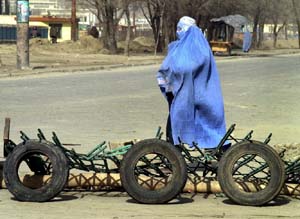

Tucson, Arizona Sunday, 14 December 2003

The Associated Press
A burqa-clad woman walks past a roadblock on the road leading to the site of
the loya jirga, or grand council, in Kabul.
By Stephen Graham
THE ASSOCIATED PRESS
KABUL, Afghanistan - Delegates assembling from every corner of Afghanistan on Saturday faced tough debate in writing the first post-Taliban constitution, the bedrock of what Afghans hope will be a better life after years of war.
Under intense security, some 500 representatives - from village mullahs to Western-educated exiles - must work out the role of Afghan women, Islam's place in politics and the sharing of power in a nation accustomed to fighting over it.
The constitutional loya jirga, or grand council, which opens today, is a key step in the two-year drive to stabilize the country under an empowered central government, and will lead to landmark national elections planned for June.
For U.S. officials pushing the process, the Afghans' experience could provide lessons for Iraq, where American administrators have faced an even tougher task in drawing up a constitution. American and Iraqi leaders have differed over how to even start drafting the document. A timetable calls for elections to choose delegates for drafting an Iraqi constitution in early 2005.
U.S. State Department spokesman Richard Boucher said Afghanistan's new charter would be a "major milestone in its transition to a constitutional, representative government that respects its traditions and protects the welfare of its citizens."
The European Union hopes for a charter that is "pluralistic and based on universal human rights, including equal rights for men and women."
But the aspirations of ordinary Afghans are simpler. "Look at the ruins of this country," said Bismillah, a 43-year-old shopkeeper in Kabul who goes by only one name. "Let's get the constitution approved so the government can get to work."
It could take 10 days to several weeks for the loya jirga, meeting in a huge tent at a Kabul college campus, to finalize the 160-article draft presented by a constitutional commission in October.
While all the delegates have arrived without reported incident after last-minute elections in the provinces, the U.S. military has warned that Taliban militants plan to disrupt the gathering. With Taliban attacks increasing in the countryside, U.S. forces have launched their largest military operation since the fall of the Taliban two years ago.
The new Afghan National Army has placed machine-gun posts and tanks near the council site's perimeter and the city's 5,500-strong international peacekeeping force is patrolling the nearby hills.
Delegates predicted testy debate over the kind of issues typical of any country edging toward democracy. Afghans appear torn, wanting a government strong enough to rein in powerful warlords but not so strong as to create the makings of a dictator.